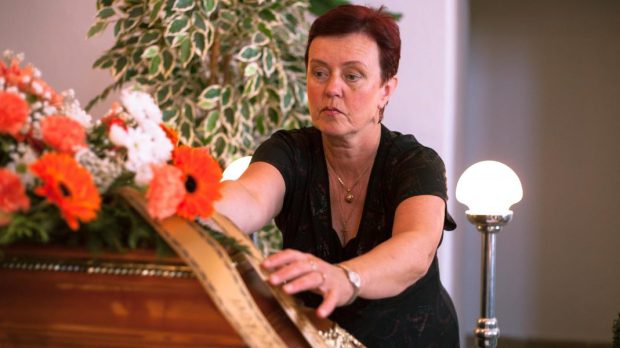I’ve long argued that Western funeral customs have become so fastidious and hands-off that they keep a grieving family at a distance from death in ways that end up shielding them from important, beautiful and ultimately healing lessons that come with experiencing the passing of a loved one.
Sadly, with the advent and increasing lawfulness of euthanasia, we are further removing ourselves from those lessons, that healing, and yes, the terrible but real beauty that comes with accompanying those we love to the end — living, sharing and finally celebrating that love, even in those difficult, gut-wrenching moments we think we cannot endure.
It was the death of my brother (and the subsequent deaths of three other brothers over an 18-month period) that first got me thinking about all that our present customs have taken from us. My mother and my aunties would recount stories of family members being waked in the living room, “We would clean and dress the body, and then sit vigil together with it until it was time to head to church and then the cemetery.”
The family’s hands were the last to serve the departed, and there were traditions and family customs that developed from it. One of my earliest memories is of my mother telling me that when she died I was to make sure she was buried with her prayerbook — a custom begun in the auld country. This is not something we would say to a four year old, these days, but to her generation, death was not a distant, hands-off, reality-bending stranger, but an inevitability to be pondered and thought about. Memento Mori may be trending right now, thanks to Sister Theresa Aletheia Noble, but back then, it was pretty common. My mother even told me — although she had another 15 years in her — to make sure we buried her in the dress she wore to my wedding. In fact, that was our first exchange that day:
“Mom, you look pretty!”
“Yes, bury me in this dress…”
Health codes exist, of course, but when did we surrender all responsibility for the care of a loved one’s remains into the hands of strangers, and might we be able to, somehow, once again involve families in some little part of that? Perhaps a funeral director might let a wife, who daily adjusted her husband’s tie, do that one last time before the wake begins — give her that one little intimacy, again? Or a daughter might attend to a mother’s dress straightening?
I did in fact remember to place my mother’s prayerbook in the crook of her arm when she was laid out, also pinning her First Communion pin to her bodice, as she’d wanted, and took some satisfaction in knowing that I’d been able to see to a final wish of hers. And yes, we buried her in that dress.
I’m thinking of all of this because of this really excellent essay by Gregory K. Hillis, which published a few days ago at Commonweal. It’s a beautifully done must-read of a piece in any case, but it’s relevant here because Hillis describes the funeral of a Trappist brother at Gethsemane Abbey — Thomas Merton’s abbey — and the familial tenderness of it:
[…] Cistercians dig their graves very deep and they bury their dead without caskets. From my perch I could see that a pillow had been placed in the grave, on which had been placed a flower. There was also a ladder leading into the grave. Never before had the words Christians recite on Ash Wednesday—remember you are dust—been as real to me as they were at that moment. After graveside prayers, one of the monks descended the ladder while others lifted Br. Harold from the bier. The sheet he was on had six long straps attached by which he was lowered into the ground. As his brothers lowered Br. Harold down, the monk standing in the grave gingerly held Br. Harold’s head. There was love and gentleness in the way the monk did this. I was reminded of the care with which my wife and I would put each of our newborn sons into the crib…
I don’t want to excerpt any more than that, because I really want you to go read the whole thing. Obviously I’m not suggesting we start digging graves with our own hands (although, unions aside, why not?) but perhaps ponder with your family what “little thing” you might want them to do for you, at your death, or what you would like to do for another. Memento Mori.
READ MORE: After Death, a Husband’s Final Act of Love for his Wife

